Standard Oil and Fuel Filters for Aircraft
 All aircraft depend on clean oil and fuel to operate safely, and high-quality filters are essential for achieving this. Count on Global Filtration for a reliable supply of quality PMA-certified filters to help streamline your aircraft maintenance program.
All aircraft depend on clean oil and fuel to operate safely, and high-quality filters are essential for achieving this. Count on Global Filtration for a reliable supply of quality PMA-certified filters to help streamline your aircraft maintenance program.
Fuel filters include micronic filters, which are like a fine mesh screen that traps tiny particles of dirt and debris that can clog fuel lines; water separator filters, which remove water from the fuel to prevent corrosion; and magnetic filters, which use magnets to attract and capture tiny metal particles that can wear down engine parts.
Oil filters include full-flow designs that filter all the oil circulating through the aircraft engine to remove dirt and wear particles. They are often used in conjunction with bypass filters, which provide an extra level of filtration and can capture even smaller particles. Magnetic filters can also be integrated to attract and capture metallic debris in the oil.
Stock up with high-quality filters for less than the cost of an OEM replacement. We have PMA lube oil, fuel, and engine oil filters for P&W, Bombardier, Allied Signal, Boeing, Honeywell, Embraer, and more. See our full list of PMA-certified filters.
Oil and Fuel Filter Changeout Schedule
Filter changes differ by aircraft and operator, but there are some general guidelines. Commercial and regional aircraft oil filters are typically changed every 50 to 100 flight hours or at each maintenance check, whichever comes first. Some newer aircraft may have longer intervals. Fuel filters are usually replaced at similar intervals to oil filters, with more frequent changes if fuel quality is a concern or if the aircraft operates in harsh environments.
Change intervals for corporate aircraft can be more flexible, potentially extending to 100 to 200 flight hours or more, depending on the specific aircraft and its usage. The fuel filter replacement schedules are linked to oil changes or calendar time, with adjustments based on operating conditions.
Oil filters for general aviation aircraft are changed every 25 to 50 flight hours or at least annually, though engines with only a screen instead of a filter may require more frequent changes. Fuel filters are often replaced at the same time as oil filters or according to the manufacturer’s recommendations.
Replacement intervals for oil filters on rotorcraft can be shorter than for fixed-wing aircraft, potentially every 25 to 50 flight hours, thanks to the demanding nature of helicopter operations. Fuel filters may need to be replaced more frequently if the helicopter regularly operates in dusty conditions.
Filter Requirements by Aircraft Type
Filters must meet specific airworthiness requirements and industry standards. For example, turbine engines generally require finer filtration than piston engines, and different fuels and oils have their own corresponding contamination profiles, which impacts filter type.
Large Commercial Jets
Oil Filters
- High flow rates to handle large oil volumes.
- Fine filtration to remove even microscopic particles.
- High capacity to hold a significant amount of contaminants.
- Often incorporate bypass valves to ensure continuous oil flow even if the filter becomes clogged.
Fuel Filters
- High flow rates to accommodate high fuel consumption.
- Multi-stage filtration to remove a wide range of contaminants, including water and particulates.
- May include features like magnetic filtration to capture metallic debris.
Corporate Jets
Oil Filters
- Smaller and lighter than those for commercial jets.
- Still require high efficiency to protect sensitive turbine engines.
- Designed for longer service life and less frequent maintenance.
Fuel Filters
- Similar requirements to commercial jets but with lower flow rates.
- Focus on preventing contamination and ensuring reliable fuel delivery.
Single Engine Planes
Oil Filters
- Relatively simple and compact designs.
- May use a combination of full-flow and bypass filtration.
- Designed for easy maintenance and replacement.
Fuel Filters
- Less complex than those for larger aircraft.
- Focus on removing basic contaminants like dirt and water.
Helicopters
Oil Filters
- Designed for high vibration and demanding operating conditions.
- May have shorter service life due to harsher operating environments.
- Robust construction to withstand high stress and potential impacts.
Fuel Filters
- Similar to those for single-engine planes but with added emphasis on water separation.
- May require more frequent changes due to potential exposure to dust and contaminants.
Custom Filtration Packages and Supply for Your Fleet
Global Filtration has a wide selection of PMA oil and fuel filters for various aircraft. Shop online now or contact us to optimize your filtration needs and maintenance costs.
